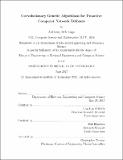Coevolutionary genetic algorithms for proactive computer network defenses
Author(s)
Erb Lugo, Anthony (Anthony E.)
DownloadFull printable version (648.2Kb)
Other Contributors
Massachusetts Institute of Technology. Department of Electrical Engineering and Computer Science.
Advisor
Una-May O'Reilly and Erik Hemberg.
Terms of use
Metadata
Show full item recordAbstract
This thesis explores the use of coevolutionary genetic algorithms as tools in developing proactive computer network defenses. We also introduce rIPCA, a new coevolutionary algorithm with a focus on speed and performance. This work is in response to the threat of disruption that computer networks face by adaptive attackers. Our challenge is to improve network defenses by modeling adaptive attacker behavior and predicting attacks so that we may proactively defend against them. To address this, we introduce RIVALS, a new cybersecurity project developed to use coevolutionary algorithms to better defend against adaptive adversarial agents. In this contribution we describe RIVALS' current suite of coevolutionary algorithms and how they explore archiving as a means of maintaining progressive exploration. Our model also allows us to explore the connectivity of a network under an adversarial threat model. To examine the suite's effectiveness, for each algorithm we execute a standard coevolutionary benchmark (Compare-on-one) and RIVALS simulations on 3 different network topologies. Our experiments show that existing algorithms either sacrifice execution speed or forgo the assurance of consistent results. rIPCA, our adaptation of IPCA, is able to consistently produce high quality results, albeit with weakened guarantees, without sacrificing speed.
Description
Thesis: M. Eng., Massachusetts Institute of Technology, Department of Electrical Engineering and Computer Science, 2017. This electronic version was submitted by the student author. The certified thesis is available in the Institute Archives and Special Collections. Cataloged from student-submitted PDF version of thesis. Includes bibliographical references (pages 47-48).
Date issued
2017Department
Massachusetts Institute of Technology. Department of Electrical Engineering and Computer SciencePublisher
Massachusetts Institute of Technology
Keywords
Electrical Engineering and Computer Science.